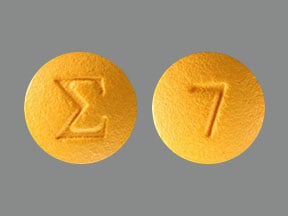
Protriptyline Coupons & Savings Card – Discount Prices from $233.51
Protriptyline is prescribed for the treatment of depression and belongs to the tricyclic antidepressant category. It functions by helping to restore balance in the brain's natural chemicals, particularly serotonin and norepinephrine, which play a key role in mood regulation. Though not as commonly used as newer antidepressants, it requires multiple doses throughout the day. Patients may experience side effects such as headaches, blurred vision, restlessness, and stomach upset. It is important to consult with a healthcare provider for personalized advice and to ensure safe and effective use of this medication.
Our coupons are free to use. Before paying, show the pharmacist your Protriptyline savings card to get your free discount. Use our filters below to edit the prescription box to match your needs. The Protriptyline prices will update based on your prescription needs. Above our Protriptyline coupons, you can change your location to see pharmacy prices and costs in other areas. We're here to help you buy Protriptyline at the lowest price with our prescription discount card.
My prescription
Edit
10MG, Protriptyline (180 Tablets)
Select pharmacy

CVS
$233.51
COUPON PRICE
Walgreens
$251.70
COUPON PRICE
Albertsons
$576.16
COUPON PRICE
Walmart
$581.07
COUPON PRICEProtriptyline savings card
Show this card to your pharmacist
CVS
$233.51
BIN
ID
PCN
GRP
019876
LHFCE91104
CHIPPO
LHX
Powered by
Protriptyline is prescribed for the treatment of depression and belongs to the tricyclic antidepressant category. It functions by helping to restore balance in the brain's natural chemicals, particularly serotonin and norepinephrine, which play a key role in mood regulation. Though not as commonly used as newer antidepressants, it requires multiple doses throughout the day. Patients may experience side effects such as headaches, blurred vision, restlessness, and stomach upset. It is important to consult with a healthcare provider for personalized advice and to ensure safe and effective use of this medication.
Our coupons are free to use. Before paying, show the pharmacist your Protriptyline savings card to get your free discount. Use our filters below to edit the prescription box to match your needs. The Protriptyline prices will update based on your prescription needs. Above our Protriptyline coupons, you can change your location to see pharmacy prices and costs in other areas. We're here to help you buy Protriptyline at the lowest price with our prescription discount card.
Related tricyclic antidepressants prescriptions
More prescriptions for depression
coupons from$16.58Save 58%
coupons from$27.64Save 60%
coupons from$532.00Save -4%
coupons from$42.64Save 70%
coupons from$21.50Save 82%
coupons from$27.64Save 60%
coupons from$424.84Save 17%
coupons from$6.26Save 92%
Related tricyclic antidepressants prescriptions
Amitriptyline Save 74%coupons from $19.87
Norpramin Save 64%coupons from $16.58
Prudoxin Save 84%coupons from $189.84
Amoxapine Save 83%coupons from $12.38
Zonalon Save 84%coupons from $189.84
Silenor Save 87%coupons from $42.64
Anafranil Save 91%coupons from $20.66
Pamelor Save 63%coupons from $12.90
More prescriptions for depression
Desipramine Save 58%coupons from $16.58
Vilazodone Save 60%coupons from $27.64
Trintellix Save -4%coupons from $532.00
Doxepin Save 70%coupons from $42.64
Paroxetine Hcl Save 82%coupons from $21.50
Viibryd Save 60%coupons from $27.64
Pexeva Save 17%coupons from $424.84
Aripiprazole Save 92%coupons from $6.26
Protriptyline dosage forms
Use our Protriptyline 5MG coupon with prices from $54.17 for 30 Tablets. You can also use our Protriptyline 5MG coupon with prices from $125.90 for 90 Tablets. We have a Protriptyline 5MG coupon with prices from $137.86 for 100 Tablets. You can use our Protriptyline 10MG coupon with prices from $233.51 for 180 Tablets.
Dosage Quantity Price from Per unit 5MG 30 Tablets $54.17 $1.81 5MG 90 Tablets $125.90 $1.40 5MG 100 Tablets $137.86 $1.38 10MG 180 Tablets $233.51 $1.30 10MG 30 Tablets $54.17 $1.81 10MG 100 Tablets $137.86 $1.38
| Dosage | Quantity | Price from | Per unit |
|---|---|---|---|
| 5MG | 30 Tablets | $54.17 | $1.81 |
| 5MG | 90 Tablets | $125.90 | $1.40 |
| 5MG | 100 Tablets | $137.86 | $1.38 |
| 10MG | 180 Tablets | $233.51 | $1.30 |
| 10MG | 30 Tablets | $54.17 | $1.81 |
| 10MG | 100 Tablets | $137.86 | $1.38 |
